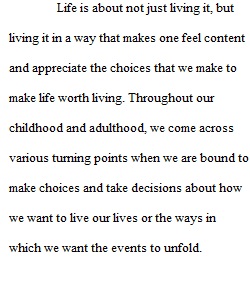


Q Final essay assignment topic: YOUR ESSAY ASSIGNMENT IS SIMPLE: What is the ultimate or final "Good" you are pursuing in your life?What is the underlying reason for all that you do? Is there a single unifying good or goal? I say that this is "simple" and it is in principle. But very few people undertake this questioning. Yet there is no more fundamental question than understanding why we live our lives as we do. Your essay should be a minimum of 6 pages of content (do not count the title page or reference pages) using APA format. You must have at least 3/4 of a page for the last page to count as a full page. It should include appropriate references to all the required readings for this course and may also include references from other relevant readings. See the Summary of due dates at the end of the Syllabus for the due date. Now: Here is some guidance as you begin thinking about your essay. "The Good" in life, as defined first by the ancient Greeks, is the final or ultimate end at which our actions aim. It's the answer to the question why you do what you do. For Epicurus, as we've seen, it was pleasure, though his explanation is much more complicated than might first come to mind. One is successful when this end is accomplished (adding perhaps the qualification "to the highest degree possible" or "to a reasonable degree"). We have reasons for what we do. For example, we looked at work in Week 2. Why do you work? For some the only goal is money. But no one wants money for its own sake. Do you really care about the pieces of paper (dollar bills) in your wallet or the numbers on your bank statement? No. People care about money for various reasons: it represents a form of security (if I lose my job I will not have to live on the street if I have ample money saved; the same reasoning goes for retirement); money can converted into material possessions. We can use money to buy things, everything from food to a home to clothes and so on. Now: why do people want security? It is a form of avoiding potential pain. (Pain is the flipside, if you will, of pleasure.) Others want money because they can use it for pleasure: food, vacations, attracting a good mate, to impress others, etc. That is the pursuit of pleasure. Remember Epicurus: he believed that people are built€ by nature only to avoid pain and pursue pleasure. And he might have been right: can you think of anything you do that is not either to avoid some pain (present or future) or gain some pleasure (present or future)? People get married, for example, in some cases to avoid the pain of loneliness. Others marry to gain the pleasure of a spouse or companion. (Sometimes it is of course a combination of both.) People buy bigger homes because they believe a bigger home will provide more pleasure (either, say, from having multiple bathrooms, a large lawn, etc., or from prestige of having the biggest home among their peers). Why do people join a religion? At least in the old days of Christianity it was as much to avoid the pain of eternal hell as it was to gain the promise of the pleasure of eternal heaven. (Though many today believe for much the same reasons.) Others join because rejecting the common religion will subject them to ridicule and being ostracized. It is better to avoid that pain and simply accept membership in the religious community. Many seek in religion a comfort. Human beings want to believe that "everything happens for a reason." Here "reason" means not just a cause, but a purpose designated by some higher power. When one goes to sleep at night, it is comforting to believe that all the struggles one endured that day were by design, and not just bits of randomness in a purposeless universe. Here religious belief is sought both to avoid the pain of purposeless struggle and to gain the pleasure of believing my life is part of a benevolent design. Now, you might wonder: if religious belief relieves pain and gives pleasure, why doesn't everyone believe in a benevolent higher power guiding our lives to a good conclusion? Good question to ponder, yes? Again, look at Epicurus: was he right in thinking that we only pursue pleasure (think of happiness if pleasuresounds limited or vulgar) and avoid pain?
View Related Questions